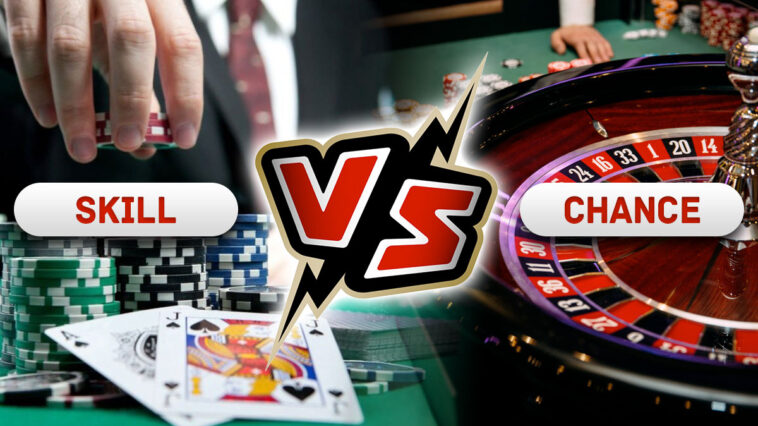Of course, this blog focuses largely on gambling, so a post about games of chance vs. games of skill is going to focus mostly on casino games. This doesn’t mean that these categories only apply to casino games, though, all games can be put into these categories.
Here’s the thing, though.
Games don’t always fit neatly into one category as opposed to the other. Many games count as both.
In this post, I’ll look at casino games that are purely games of chance. I’ll also look at casino games that have larger and smaller skill elements to them.
Casino Games of Pure Chance
Most casino games are what you’d call games of pure chance. The outcomes are entirely random, and no amount of skill on the part of the player affects the outcome.
Roulette is the first example I can think of. You have 38 numbered slots on a spinning wheel. The ball falls into one of those spots at random.
No amount of skill on your part can affect the outcome of that game. You don’t even get to spin the ball around the edge of the wheel; the croupier does that.
Slot machines are another example of a game that’s purely powered by chance. Nothing you do affects the outcome of the spinning reels. It doesn’t matter if you use warm coins or cold coins, and it doesn’t matter if you use the spin button or the lever on the side of the machine.
Some people think they can predict the outcome of a slot machine spin based on what’s happened previously, but slot machines aren’t just random—they’re games made up of random, independent events. What happens on the previous spin has no effect on the outcome of a subsequent spin.
Baccarat and casino war are basically just guessing games where you have no skill involved. You might think you’re psychic and able to predict outcomes, but let’s be realistic:
You’re not.
Casino Games That Have an Element of Skill
Real money blackjack is a casino game that has randomly determined outcomes, but it’s NOT a game of independent, random events. The make-up of a random deck of cards changes as those cards are dealt. This creates opportunities for skills like counting cards.
Blackjack also has decision points where your decisions can improve or hurt your odds of winning. If you have a total of 19 and hit, you’re probably going to bust. Only a fool would make that decision in that situation.
That doesn’t require a lot of skill, but it’s a basic strategy issue. And basic strategy is reasonably easy to learn.
I should also point out that just because a game has an element of skill doesn’t mean that it’s a game you can bet with skillful play.
If you master basic strategy in blackjack, you can reduce the house edge to its lowest point, but the house still has an edge.
And if you can count cards, you can get an edge over the casino (if you’re good at it), but the outcomes of individual hands are still based on chance.
Video Poker Is Another Casino Game With a Skill Element
In video poker, you get a random five-card hand, but then you have to decide which cards to keep and which ones to throw away. Kenny Rogers would love this game.
Deciding which cards to keep and which cards to discard is where the skill element of the game comes into play. As with blackjack, the outcomes are still determined randomly.
But you can reduce the amount of the edge that the house has over you by playing skillfully.
Here’s an example:
You have a hand with a pair, but you also have four cards to a royal flush.
If you keep the pair, you have a 100% probability of an even-money payout.
If you discard the card from the pair to try to make the royal flush, you have a 1/47 chance of getting a royal flush, which pays off at 800 to 1.
It’s better to throw away the sure thing in exchange for the shot at the big payoff here.
That isn’t the case with every hand in video poker, but it is with this one. Knowing the difference and acting accordingly is where the skill comes into play in video poker.
Skill Doesn’t Make the Game Less Random
The house edge is the mathematical, statistical advantage that generates the profits for the casinos. It results from the difference between the odds of winning a bet and the payout odds for that bet. Almost every bet in the casino has a house edge.
There are two exceptions—the odds bet in craps and the double-up feature on some video poker machines. Those two bets have a house edge of 0%, but you’re required to place a bet that does incur a house edge before being allowed to place either of those bets.
Here’s an example of the house edge:
In roulette, if you bet on a single number and win, you get a 35 to 1 payout.
The odds of winning that bet are 37 to 1.
If you make 38 spins, you’ll win 35 units once, but you’ll lose a single unit 37 times, for a net loss of 2 units.
Those 2 units are the house edge, which, expressed as a percentage, is 5.26%.
You have no way to beat that house edge, either. As we discussed earlier, the game of roulette is entirely chance-based.
Craps Is Unusual in this Discussion
Craps is unusual here because there’s some debate about whether there’s a skill element or not. Some reputable gambling experts believe that by “setting” the dice before throwing them and by using a “controlled throw,” a skilled dice shooter can affect the odds of winning.
You can find books and videos with tutorials about how to accomplish this. I should note, too, that even the proponents of this don’t contend that controlled shooting or dice control changes the game from a game of chance to a game of skill.
Instead, they compare it to darts, where the outcome is still random, it’s just influenced by your level of skill.
I’m skeptical about dice control, and I’ll tell you why:
Casinos don’t panic about dice control experts.
When card counting became a thing, casinos panicked and started making changes to the conditions of the game. They started by eliminating the bonus payout for a natural, but that stirred up so much rancor on the part of the blackjack players that they relented and changed it back.
Instead, they found other ways to thwart card counters. They started using more decks, making it harder to count cards. They started using automatic shuffle machines, making it impossible to count cards.
They also started backing suspected card counters off their games. They even went so far as to deal with a private investigator company to create a book of card counters that they could share and keep out of the casinos.
They’ve done nothing that compares to this when it comes to thwarting dice control experts.
I suspect most casino managers would laugh if you told them that someone could get an edge at craps by controlling their dice throws.
After all, you must throw the dice all the way to the other end of the table, and they just bounce off the back wall. Try throwing the dice so softly that they don’t even tumble and see what kind of reaction you’re going to get from casino management.
I could be wrong, but I don’t think craps is a game of skill.
Isn’t Poker a Game of Skill?
Games of skill and games of chance, as we’ve discussed, aren’t mutually exclusive. A game can have outcomes determined by chance where you can still affect the odds with skillful play.
Poker is such a game.
Also, poker ISN’T a casino game, even though it’s played in casinos. Real poker is played against other poker players. Casino games require the gambler to play against the dealer.
You will find some “poker-like” games in the casino, like Caribbean Stud or Ultimate Holdem, but such games only borrow the trappings of poker. You’re still playing against the casino. They have more in common with video poker than they have with real poker.
The outcome of each specific hand in poker, though, is determined at random. Unless you’re a card mechanic, you don’t control which cards fall. All you can do is decide how to play the cards you get.
You can play your cards perfectly and still lose a ton of money, especially if you’re playing no limit poker.
Poker actually has multiple skill elements to consider that affect your long-term results. Hand selection is one of the most basic skills in poker. If you’re playing lousy hands all the time instead of folding them when you should, you’re going to lose money in the long run.
Aggression is another important skill in poker. I should probably say “selective aggression,” though. The idea is that when you have a good hand, you should bet and raise with it. Also, you should sometimes bet and raise with a lousy hand.
This brings me to another skill in poker—deception. The Fundamental Theorem of Poker says this:
Every time you play a hand differently from the way you would have played it if you could see all your opponents’ cards, they gain; and every time you play your hand the same way you would have played it if you could see all their cards, they lose. Conversely, every time opponents play their hands differently from the way they would have if they could see all your cards, you gain; and every time they play their hands the same way they would have played if they could see all your cards, you lose.
David Sklansky came up with the Fundamental Theorem of Poker years ago, but you can probably see how if you’re easy to read and never try to deceive your opponents, you can’t achieve what you need to achieve to profit.
Bluffing and semi-bluffing are examples of deception in the game of poker.
Reading opponents is another skill. If you have an idea about your opponents’ general tendencies, you can use that read to inform your decisions.
Calculating odds is another skill in poker. Weighing your odds of winning versus the odds offered by the pot is, in fact, one of the most critical skills in the game.
Don’t believe me?
Consider this—
everyone gets the same cards in poker in the long run.
But some players walk away winning millions, while others go broke constantly.
Surely, there’s a difference.
Games of Skill Are Still Gambling
I’ve seen heated debates whether poker should be considered gambling since it’s arguably a game of skill.
Since you’re risking money, and since you could be wrong and chance still affects your results, poker is still gambling. Just because it’s a game of skill doesn’t mean you’re not gambling.
You could bet someone that you could beat them at pool, knowing that you’re a far better player than they are. You might even have a close to 100% probability of winning.
But you’re still gambling.
The distinction seems to matter a lot to legislators and judges, though, but that’s another blog post.
Conclusion
Casino games can roughly be categorized into those games which are pure chance and those which have some element of skill to them.
I think the games where there’s an element of skill are a lot more fun.
Try them! You’ll probably agree.
Michael Stevens
Michael Stevens has been researching and writing topics involving the gambling industry for well over a decade now and is considered an expert on all things casino and sports betting. Michael has been writing for GamblingSites.org since early 2016. …





